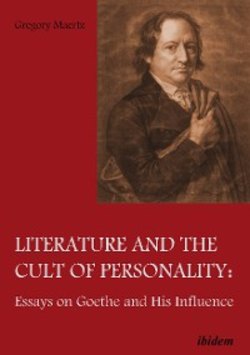Читать книгу Literature and the Cult of Personality - Gregory Maertz - Страница 5
Preface
Оглавление“Every Goethe text, however divergent from the others, bears the mark of his unique and overwhelming personality, which cannot be evaded . . .”
Harold Bloom[2]
This book argues that the fabrication of Johann Wolfgang von Goethe, the German poet and polymath, as an Anglo-American sage and literary icon was the product of a cult of personality that lay at the center of nineteenth-century intellectual politics. A reconstruction of the culture wars fought over Goethe’s authority in Britain and the United States, a previously hidden chapter in the intellectual history of the period ranging from the late eighteenth century to the threshold of Modernism, is thus the focus of Literature and the Cult of Personality. Marginal as well as canonical writers and critics participated in this process, and the essays that follow offer insight into the mediation activities of Thomas Holcroft, Henry Crabb Robinson, Lord Byron and Percy Bysshe Shelley, Thomas Carlyle, the cream of New England intelligentsia, and George Eliot. For women writers and Jacobins as well as Dissenters, Scots, and Americans, transmitting the works of Goethe to an English-speaking audience emerges as an empowering paradigm of literary development according to which “re-writers” became original writers through an apprenticeship of translation and reviewing.
At the center of this process stands the figure of Carlyle who simultaneously serves as the chief advocate for and embodies the beau idéal of Goethean Bildung or self-realization in Britain. Approaching mid-century, Carlyle’s emphasis on the person of the poet rather than the poetic text—and thus the construction of the Goethean cult of personality—continues and exfoliates in the writings of Carlyle’s epigones and imitators. By reading Goethe’s life experiences and personality as exemplary and worthy of emulation, Carlyle established a pattern that will dominate British and American cultural life throughout the last decades of the nineteenth century. Initially limited to Goethe and German literature, Anglo-American enthusiasm for the German intellect eventually encompasses aesthetics, philosophy, theology, and science.
The voices of Goethe’s opponents—critics writing for The Anti-Jacobin Review as well as more prominent figures such as William Taylor, Samuel Taylor Coleridge, William Wordsworth, Thomas De Quincey, William Hazlitt, and George Saintsbury—are equally well represented in this book. Anticipating the opposition to high theory in the modern academy and the personal attacks on the émigré scholar Paul De Man, who, like Goethe, once served as the mouthpiece of an authoritarian regime, Goethe’s British and American antagonists in the Romantic and Victorian eras, typically cultural nationalists with an inward-looking conservative agenda, seek to construct, preserve, and defend a myth of the self-sufficiency of British literature.
In the diverse and fascinating body of critical writing and translations examined in this book textual exegesis plays an unexpectedly minor role; in its place a full-blown cult of personality materializes along with a blueprint for an ideology of hero-worship that becomes more fully mapped out in the cultural and political life of twentieth-century Europe and early twenty-first century America.
